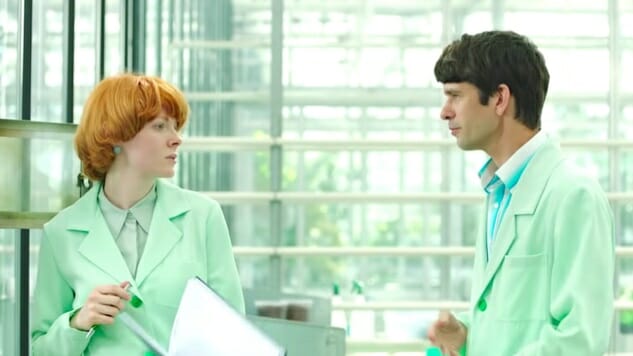
Jessica Hausner’s Little Joe may not be as straightforwardly campy as Frank Oz’s Little Shop of Horrors, as squirmy as Carter Smith’s The Ruins, or as pants-on-head stupid as M. Night Shyamalan’s The Happening, but in its way it’s equally as weird as each. Maybe botanical horror movies can’t help being odd; even the tragically melancholic Creepshow segment “The Lonesome Death of Jordy Verrill” reads as overarchingly bonkers, as if the very notion of alien flora encroaching over the entire planet is a smidge too far-fetched even in the realm of genre.
These movies each work to offset the innate unbelievability of their premises, including Little Joe, a deliberately paced bit of Marxist criticism that’s equally as coy as it is chilling. Botanist Alice (Emily Beecham) has perfected her attempts at fashioning a genetically modified plant, designed to emit a scent to stir feelings of deep contentment in any person who catches a whiff of its bouquet. Alice has denied her creation reproductive capabilites because as movies have taught us, taking sex organs away from sentient beings bred in a lab is never a terrible idea. (Life, to quote Jurassic Park, finds a way.) So it goes in Little Joe, as Alice’s colleagues fall one by one under the crimson plant’s sway and quietly devote themselves to its propogation, like genial, low-key pod persons.
Whether viewers find Little Joe frightening or funky depends on where they’re sitting. Hausner and co-writer Géraldine Bajard very clearly don’t intend the film as an outright scary experience on the page. There’s a distance between the characters, and in turn between the characters and the audience, an emotional buffer that keeps everybody at arm’s length from one another. On screen, this is actualized through cool, precise filmmaking, the camera mechanical in even its smallest movements. Dolly shot after dolly shot, Little Joe impresses itself upon the audience through clinical style, which sounds dry in theory but works to Hausner’s advantage in practice. No one in her constructed world emotes much, whether Alice, her teen son Joe (Kit Connor), the Big Joe to her Little Joe, or her besotted coworker, Chris (Ben Whishaw). This is a subdued movie littered with subdued characters.
No wonder Alice engineers a house plant to induce chemical happiness—joy is a rare commodity in Little Joe. In a nifty little tweak of the botanical horror niche’s formula, the happier a character is, the more likely it is that they’ve been snared by Little Joe’s intoxicating aura, and honestly: Is that really so bad? Hausner flirts with the question, because of course a movie fueled by muted sentiment can’t come right out with big existential queries about the cost of happiness; that would betray its aesthetics. The bulk of the legwork necessary to convey the film’s sobering jitters falls on Beecham’s shoulders, first as the insider looking out, then as the outsider looking in. Her superiors don’t have especially flattering feelings about her work, until her work begins to affect them, and by then Alice’s thoughts on Little Joe have grown muddled.
Like happiness, success has a hidden, built-in cost. Whether or not that cost is too high is mostly left open-ended, save for a denouement reminding the audience of how easily free will can be stolen from us without our knowing it. Truth told, Hausner’s screenplay could have used a little pruning—she’s allotted herself too much time to tell the streamlined story she’s written for herself. Little Joe could use a trim for better deployment of plot and unnerving atmosphere. No matter. Little Joe is a quirkily rattling movie, an off-kilter tonic during the year-end onslaught of movies proclaimed “important” by their studios, and what the film lacks in structure it makes up for in its eerie, cold singularity.
Director: Jessica Hausner
Writer: Jessica Hausner, Géraldine Bajard
Starring: Emily Beecham, Ben Whishaw, Kerry Fox, Kit Connor, David Wilmot, Phénix Brossard, Sebastian Hülk, Lindsay Duncan
Release Date: December 6, 2019
Bostonian culture journalist Andy Crump covers the movies, beer, music, and being a dad for way too many outlets, perhaps even yours. He has contributed to Paste since 2013. You can follow him on Twitter and find his collected work at his personal blog. He’s composed of roughly 65% craft beer.